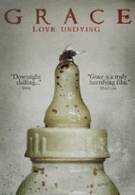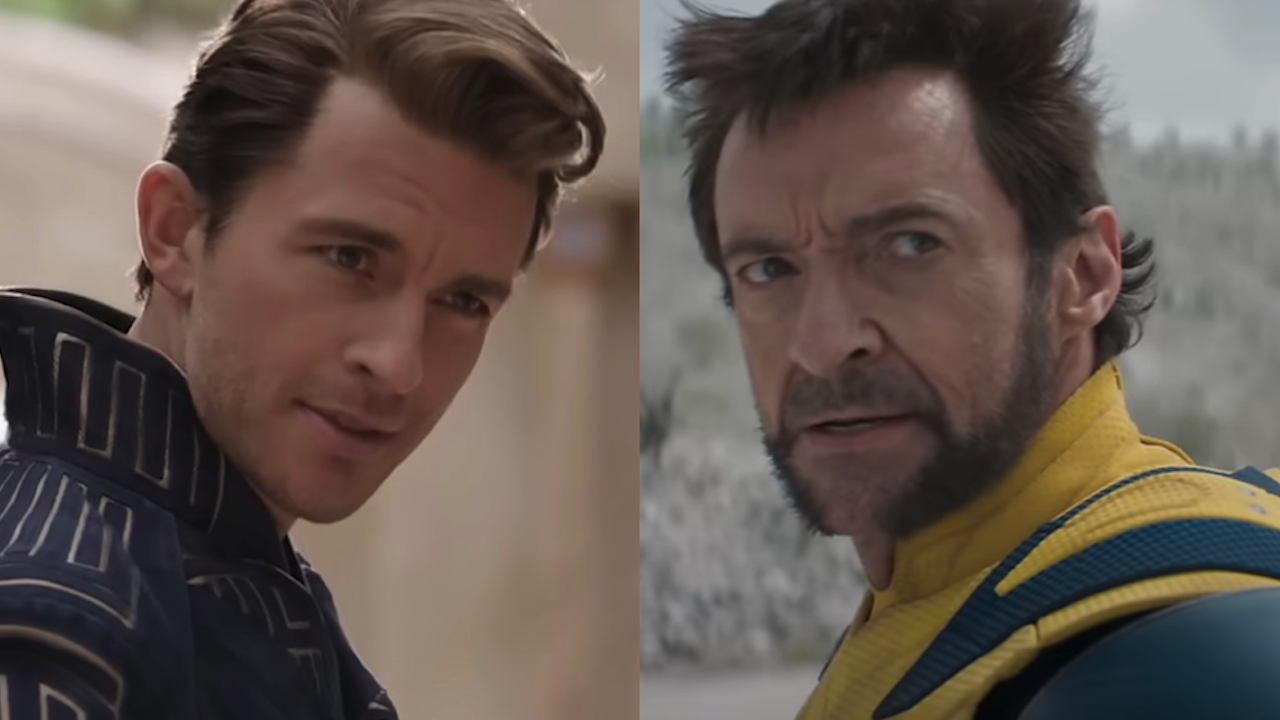I use the words "classic" and "horror" together as often as I use "meaningful" and "Renny Harlin" together, though he did Nightmare on Elm Street 4's classic "girl turning into a roach" scene, but it wasn't meaningful. Paul Solet's Grace defies my convictions and forces me to throw compliments at it from all directions. It gears so far from everything in multiplex horror that it almost becomes a work of classical art based on that criteria alone, but there's too much here to rest just on those laurels. It's steeped in the claustrophobic character pieces of the late 1960s and early 1970s. It allows one actress to anchor its difficult plot and doesn't dehumanize her along the way. Its small cast of 10 or so doesn't have any teenagers in it. There are no gravel-voiced killers in masks. There is baby Grace, however, and she's hungry....so, so hungry. Feed her, won't you? Madeline and Michael Matheson (Jordan Ladd and Stephen Park) are an alliterative couple trying to conceive a child after two previously botched pregnancies. The movie opens with the first of many scenes containing anti-arousing nudity. In this case it's Michael's buttocks, which could be sexual, but the sex he's giving his wife is anything but. It is an act of duty, not lust. They have dinner (later, obviously) with Vivian and Henry Matheson, Michael's parents, played by a perfectly unsettling Gabrielle Rose and a cuckolded Serge Houde. Vivian and Madeline do not see eye to eye on delivery methods. Madeline is keen on an old teacher/lover of hers, Patricia (Samantha Ferris), who runs a holistic, vegan midwife clinic; while Vivian is a cockstrong believer in western medicine, particularly in her own Dr. Richard Sohn (Malcolm Stewart). It has to be said that Gabrielle Rose would not be the same actress without her aristocratic nostrils, which oddly enough add as much of an air of haughtiness as her mannerisms.
On a drive home one night, Michael crashes the vehicle into a tree while trying to pass someone on the road. He dies on impact, and Madeline is soon found sitting in a large puddle of blood coming from her nether regions. I'm not giving anything away here: the baby inside of Madeline is dead. Emotionally wrecked, she keeps the baby inside for three weeks until her natural due date. Not to fault the film, but this is a level of determination that supercedes mental logic. You might as well get John Travolta's face grafted onto your own.
In a harrowing scene that affects all of the senses it can, including a rotten taste in the back of the mouth, the staff of the midwife clinic delivers Madeline's baby. Paul Solet and Co. are very careful throughout the film so as to not exploit anything represented onscreen. Obviously, a child's post-mortem birth within the context of a horror movie has disaster written all over it, but the very genuine anguish coming off of Ladd and Ferris does wonders for grounding the scene in grief, rather than hysterical disgust. Once Madeline calms down, she asks to hold her baby, and is allowed a bit of private time with her. It's depressing to watch her fawn over the graying child, and more so when she solemnly wishes life back into it. But it's a wholly different thing altogether when the nurse steps in to separate the two and finds the child suckling on Madeline's breast. "Grace. Her name is Grace." Spooky shit. Most of what I've explained thus far can be seen in the short, Grace, that Solet filmed as an example for financiers. (More on it later.)
From there, believe it or not, things go downhill. Madeline's insistence not to visit a hospital doesn't allow her a second opinion on her baby's health; she can only rely on her own. Grace starts to emit strange odors. Flies begin to flock around her. There are some really, really creepy shots involving flies. I kind of thought that Drag Me to Hell had cornered the market on "fly" shots, but this movie takes the cake and infests it. Oh, Grace also has this thing about feeding. Being the nature-centric woman she is, Madeline is insistent upon nursing with her own milk, but that’s not exactly what Grace is after. And they aren't the only characters involving themselves with breast milk. Vivian, beyond devastated after Michael's death, develops a sub-obsession with Grace's safety, which she can never confirm due to Madeline's increasingly hermitic existence. Vivian snaps at Henry for the littlest things, and takes to fondling herself and making use of decades old breast pumps. I'm not saying Paul Solet watched a few Takashi Miike movies in his time, but...wait, that's exactly what I'm saying. These things never feel particularly perverted based on visuals alone, but the subtext and unspoken histories of the characters certainly evoke uncomfortable squirms. I refuse to go on with the plot, because there are at least a half dozen times where I hollered, "Oh, shit!" while watching, and these things do not need to be spoiled. Take heed, however, that none of them are bunk scares. No heavy music cues while Madeline looks into her medicine cabinet mirror.
This movie revels in its relevant themes and subtext. There is a strong "nature versus nurture" motif, but not in its usual form. The point isn't so much whether Madeline's methods of child-rearing are affecting Grace's ability to grow into a functional adult. The movie doesn't take us that far, anyway. What's important here is whether raising a formerly stillborn child is destroying Madeline's sanity, or if her stability was all that strong to begin with. Solet keeps a strong focus on femininity and motherhood, and though it won't ring true to all women, nothing feels gratuitous to me. The women aren't victims, but rather multi-faceted beings with staked-down beliefs and convictions. Not always understandable convictions, but steadfast ones, nonetheless. I'll never know the tribulations of childbirth, and I really am okay with that after watching this. Incidentally, I read people saying that newborn mothers shouldn't watch this movie, which is kind of stupid. It's like saying people who run hotels shouldn't watch Psycho. Most newborn mothers aren't going to have to worry about reanimated babies. Most.... For a fan of Grace, this DVD is the epitome of quality. For a non-fan, it's probably torture. The features are extensive and entertaining. I read a review on some horror website that had a complaint that the DVD did not include the original short film. I'm guessing the guy didn't get his copy from Best Buy like I did, because as a Best Buy exclusive, the short was included. As said, it was done to prove Solet's chops to producers in order to fund the feature. The short is an expressionist take on the first third of the movie, told in quick scenes between fades. The roles of Madeline and Michael were played by TV vets Liza Weil and Brian Austin Green. It's a creepy little piece, but doesn't add to or take away from the full film, so it's up to you whether you watch it before or after.
The featurettes included definitely help you get to know "Paul Solet the man," and "Paul Solet the director." He seems like a really solid guy on most fronts, and was able to make this movie against tons of setbacks and changes. It starts with "Grace at Sundance," a 40-minute voyage stretching across the trip to Utah, through a few screenings and Q&A's, through heavy grassroots promotions, and up to major critical hype by the time the festival was over. Solet famously walked the streets for both Sundance and other festivals with a prosthetic dead baby strapped to him in a Bjorn, which actually helped him to land producer Adam Green as a backer. Adam Green is notable for making one of my least favorite movies ever in Hatchet. An interesting tidbit is that two males fainted at the first screening, and Solet spends the rest of the festival both holding this in high regard, and quashing it as trivial. Solet and Green, along with cinematographer Zoran Popovic, provide the film's commentary, which rehashes some featurette info, but works well as a standalone and is inspiring to any would-be filmmakers.
In an effort to be brief, I'll combine the next few. "Grace: Conception," "Grace: Family," and "Her Mother's Eyes: The Look of Grace" are all densely detailed spots (at about 10 minutes each) concerning each aspect noted. The concept stuff has Solet talking about the bajillion script rewrites and how he originally intended it to be a creature feature. The family spot focuses on the relationships between characters and the inner workings of Madeline. The last one is the most entertaining for me, because it shows all of the camera work involved. There are lots of effects used in camera, with less attention paid to any computer effects. Lots of grainy, off-colored filters and frame-slowdowns going on throughout many tense scenes, which speaks highly for Solet and Popovic. There is also "Lullaby: Scoring Grace," where the film's "composer" Austin Wintory explains his motivations for the moody, captivating score that flows and pops behind the movie. A little attention is paid to general sound design as well, especially for the flies.
Your Daily Blend of Entertainment News
Finally, there's "Grace: Delivered," which is an over-extended production diary. For a 17-day shoot, it feels like they showed almost every fucking thing they did. This one clocked in at 35 minutes or so, and while much of it is amusing and shows many complications that arose, it could have been skimmed down. (Like this review, maybe.) This and the Sundance featurette put together are almost longer than the whole movie. That said, it's worth watching for the practical effects they put together. The crew looks like a ragtag bunch of freaks, but it's a passion project, so they're just what the holistic doctor ordered.
Are you looking for a character-driven horror with über-dark comedic undertones? Do you never want to look at someone else's newborn the same way ever again? Do you have a lactation fetish? If answering yes to one or all of the above, call yourself a weirdo and watch Grace immediately.

Nick is a Cajun Country native and an Assistant Managing Editor with a focus on TV and features. His humble origin story with CinemaBlend began all the way back in the pre-streaming era, circa 2009, as a freelancing DVD reviewer and TV recapper. Nick leapfrogged over to the small screen to cover more and more television news and interviews, eventually taking over the section for the current era and covering topics like Yellowstone, The Walking Dead and horror. Born in Louisiana and currently living in Texas — Who Dat Nation over America’s Team all day, all night — Nick spent several years in the hospitality industry, and also worked as a 911 operator. If you ever happened to hear his music or read his comics/short stories, you have his sympathy.

